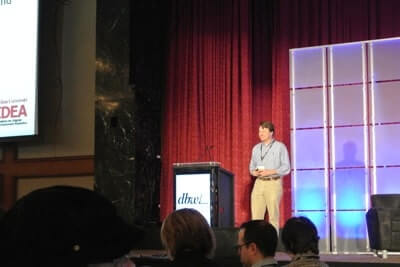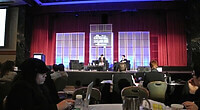
Michael D. Smith, Professor of Information Technology and Marketing, Carnegie Mellon University, spoke about piracy in the digital book realm. He was at the Digital Book World conference today in New York, and mentioned during his session that piracy is mainly an economic problem. He went on to elaborate that there were four main myths in the publishing industry and from the public at large. “Myth 1, piracy doesn’t harm sales. Myth 2, you can’t compete with free. Myth 3, anti-piracy regulation can increase sales. Myth 4, academic studies have shown that piracy doesn’t harm sales, but 25 studies, which aren’t often quoted, show that piracy does indeed harm sales.
He really started to get going in his talk when he talked about how publishers “can’t compete with free” as a myth, that was adopted by the movie industry. Studies though have shown that competing with free is just a special case of price competition, and that they can use added value to make customers pay for the product. If you look at some major trends in the Movie industry, NBC yanked content from iTunes in 2007 and immediately thereafter showed an 11% increase in piracy. When NBC piracy increased, there was also an increase ABC and Fox piracy because people learned how to pirate. Statistically, there was a small decrease in piracy when NBC returned to iTunes. People would rather pay for the content, but if it is not easily available, pirating is the next choice.
Amazon fell victim to piracy in 2012 when many publishers yanked all of their titles in the ebook library, due to wholesale pricing or agency pricing. During this time, piracy also increased. He also cited that when the digital editions of books are delayed until weeks or months after the trade versions are out, this can also cause piracy. When the electronic version is widely available, publishers found a 52% decrease in ebook sales after release, so it doesn’t pay to wait.
When the customer starts walking down the shady road of piracy, they often don’t come back to being paid customers again. If publishers want to compete with piracy and free content, the best strategy is to make the content available and at a reasonable price. Data suggests that you want to use anti-piracy laws to make it less attractive than paying for the product. HADOPI laws in France seem to have reduced piracy in that country, and this happened before law went into effect.
He wrapped up the conference by imploring the audience to look at the recent Megaupload website being shut-down. He found that this caused a statistically significant increase in digital sales once it was gone for good.
